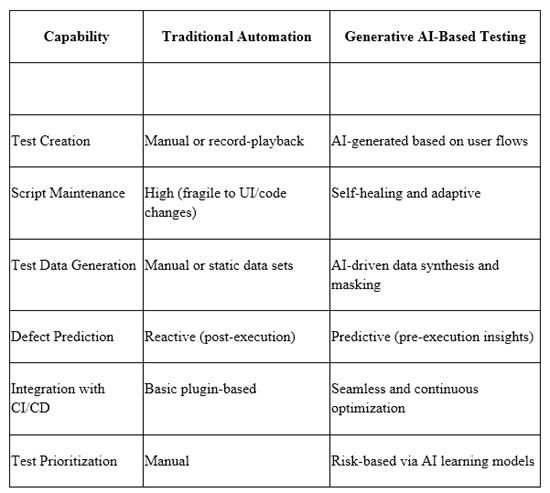The software landscape is changing like never before, driving development teams to release quicker, producing better quality with minimal defects. Even though conventional testing approaches have been the fundamentals, they often fail in this fast-paced environment. Here comes Generative AI in software testing — a game-changing shift that empowers QA teams to automate smarter, predict failures sooner, and follow best practices to scale and accelerate testing.
In this article, we will get deeper insights into what Generative AI means to testing, how it fairs with traditional automation, and how platforms like ACCELQ are redefining software quality with AI-derived innovations.
What is Generative AI in Software Testing?
Gen AI uses the power of machine learning (ML) and artificial intelligence (AI) models to generate, run, and maintain test cases automatically. Traditional automation uses hardcoded logic to represent specific steps in the process or follow actual paths or test cases defined manually. At the same time, Gen AI analyzes the code’s path dynamically, predicting potential failures and optimizing the process in real-time throughout the test.
How it works:
- Learns from historical test data and system behavior
- Identifies UI/code changes and self-heals test scripts
- Generates relevant test data while maintaining compliance (e.g., HIPAA, GDPR)
- Prioritizes test execution based on business risk and past trends
This leap in automation brings us closer to truly autonomous testing, freeing up testers to focus on strategy rather than script maintenance.
Key Capabilities of Generative AI Testing Tools
To better understand how Generative AI enhances QA, let’s break down its capabilities compared to traditional test automation tools.

By embracing these capabilities, teams can test more in less time—and with fewer resources.
Benefits of Generative AI in Software Testing
The move to Gen AI isn’t just about automating faster; it’s about testing smarter. Here are the top benefits organizations are seeing from integrating AI into their test strategy:
1. Automated Test Case Creation
With AI-powered tools, test cases are created automatically based on user stories, workflows, or historical test data. This significantly reduces human effort and errors while improving coverage.
2. Self-Healing Automation
UI or code changes no longer break tests. Gen AI detects changes and updates test steps automatically, reducing maintenance time and preserving test reliability.
3. Intelligent Bug Prediction
AI models analyze past patterns and identify probable defect zones even before the code reaches production. This predictive approach drastically lowers post-release defect costs.
4. Smarter Test Data Management
Generative AI tools can create or mask data that matches real-world scenarios while complying with security and privacy standards like GDPR and HIPAA.
5. Accelerated CI/CD Integration
Gen AI fits naturally into modern DevOps pipelines, integrating with tools like Jenkins, GitHub Actions, and GitLab CI for continuous test optimization.
If you're curious about how Gen AI fits within broader Agile and DevOps frameworks, explore this detailed guide on how Gen AI is transforming Agile DevOps.
Use Cases Across Industries
Generative AI is not just a one-size-fits-all approach. It is already driving test innovation across various domains:

Such broad applicability makes Gen AI a strategic fit for any domain seeking scalability and rapid quality feedback.
Why ACCELQ Autopilot Leads the Way?
While multiple tools offer AI-based testing, ACCELQ Autopilot goes further by enabling Agentic Automation—AI that not only automates but also thinks and adapts like a QA engineer.
Here’s why ACCELQ Autopilot stands out:
1. Scenario Discovery and Test Generation
Automatically creates UI and API test scenarios from plain English requirements or user flows—no coding required.
2. Modular Test Design
The AI Designer structures test cases into reusable components, making test maintenance seamless and scalable.
3. Autonomous Healing and Logic Insights
ACCELQ Autopilot doesn’t just detect changes—it fixes them. Its autonomous healing adapts test logic and offers intelligent design suggestions to optimize quality and performance.
4. Integrated AI-Powered Test Management
ACCELQ goes beyond execution and addresses test planning, analysis, and coverage—all within one no-code platform.
The combination of modular design, agentic intelligence, and self-healing capability makes ACCELQ a market leader in AI-based QA transformation.
Real-World Impact and Future Outlook
With the generative AI market projected to exceed $1 trillion by 2034 (according to Precedence Research), its footprint in QA will only deepen. Statista forecasts that this market will reach $62.7 billion by 2025, driven by text-to-code, predictive analytics, and AI-enhanced DevOps tools.
Forward-thinking QA teams are already using Gen AI to:
- Slash test creation time by 80%
- Reduce defect leakage by over 40%
- Improve test coverage by 3x across device and platform combinations
Generative AI is no longer a futuristic add-on—it’s a business enabler.
Final Thoughts
Generative AI in software testing is redefining the rules of quality assurance. From test case generation to intelligent orchestration and predictive analysis, AI is bringing speed, precision, and agility to every step of the testing lifecycle.
ACCELQ Autopilot is the definitive solution for teams ready to scale QA while reducing costs and increasing release velocity. With a full-stack, no-code approach and deeply embedded AI, it’s built for the future of autonomous testing.
Ready to modernize your QA with Generative AI? Discover ACCELQ Autopilot and transform your testing today.